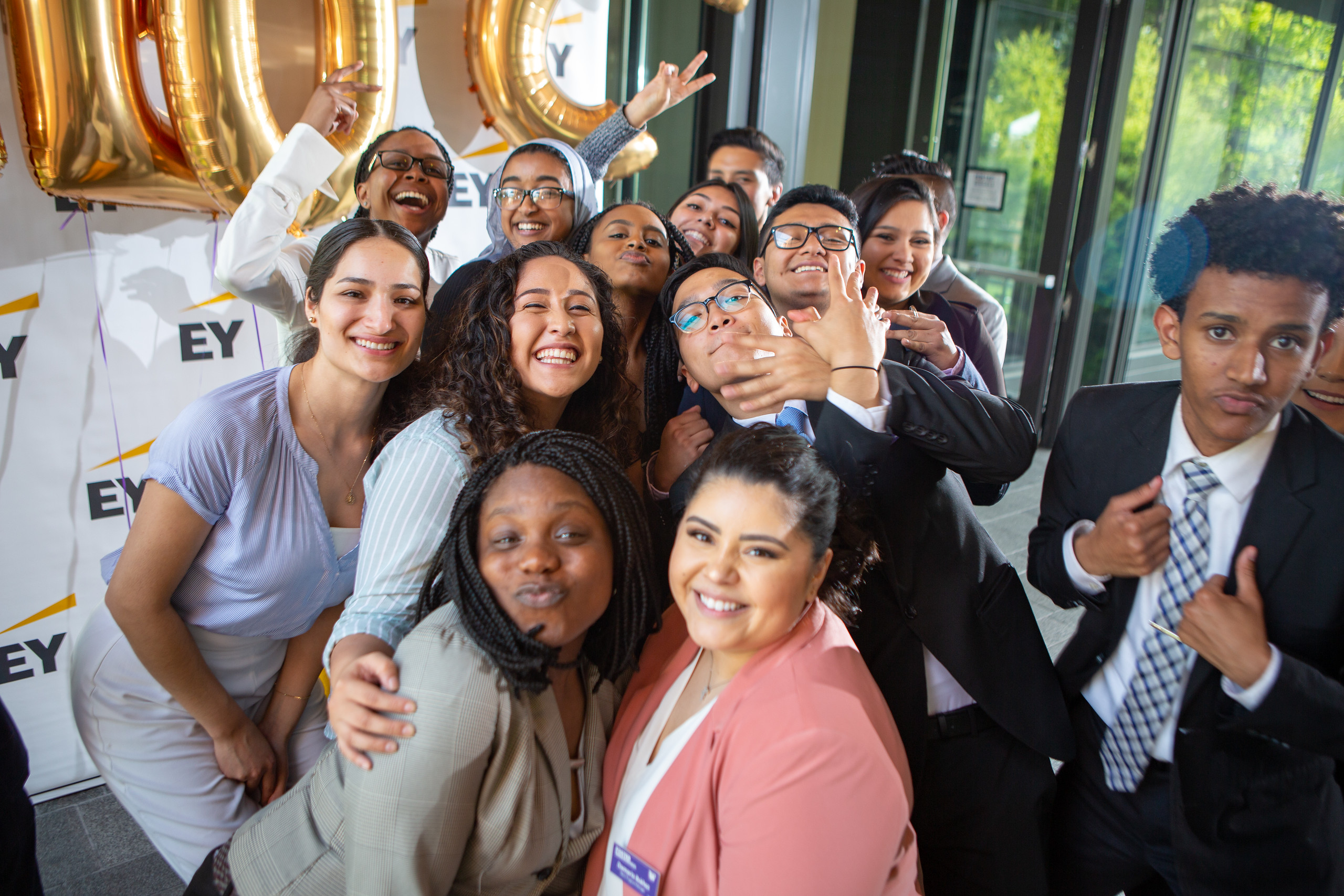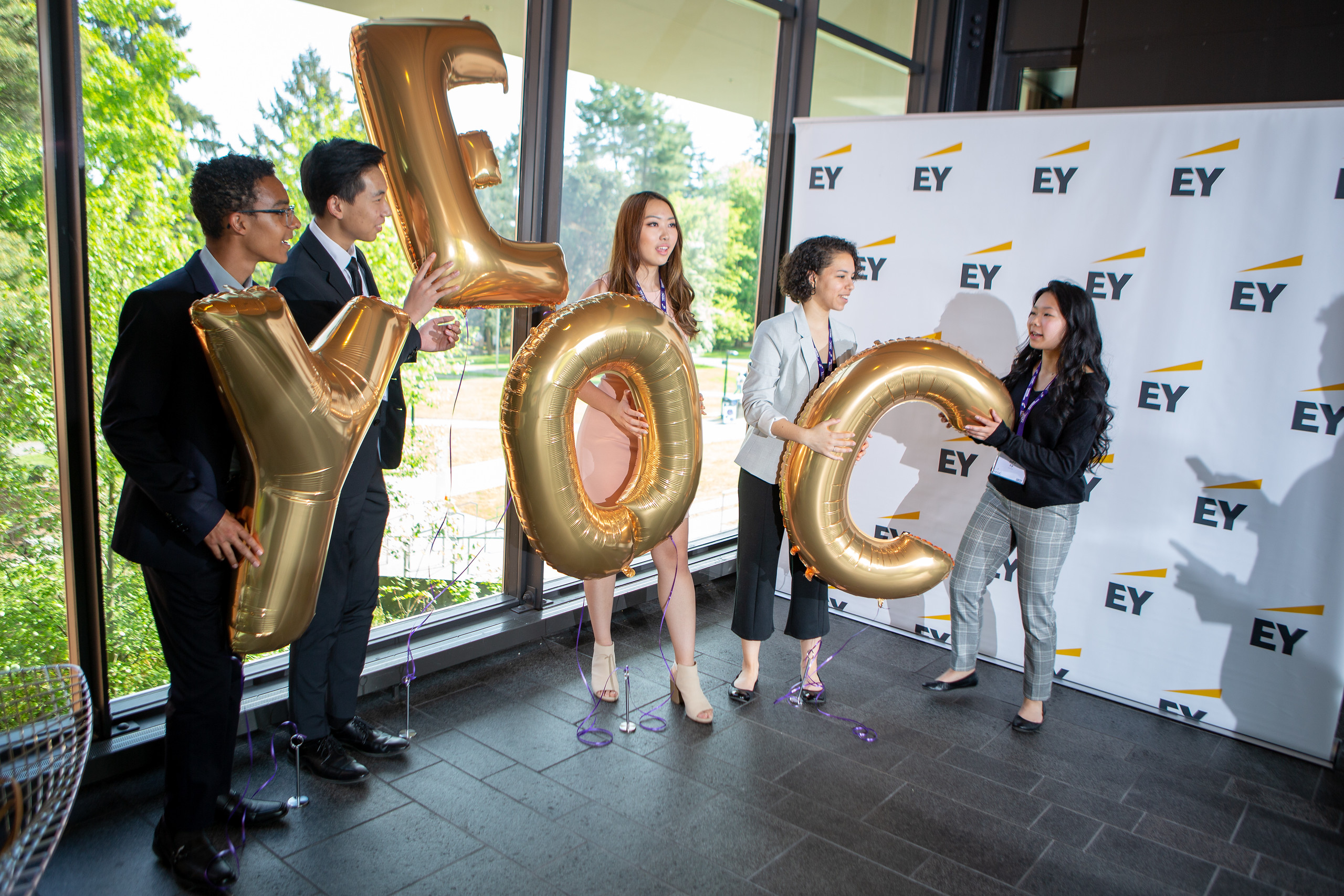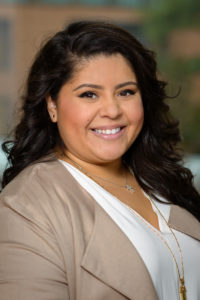15 Years of Young Executives of Color: A Q+A with Damariz Ibáñez, YEOC Program Manager

Damariz Ibáñez (center front) and program mentees at the Young Executives of Color 2019 End of Year Celebration
Young Executives of Color at the Foster School of Business is celebrating 15 years of cultivating the academic potential of high school student leaders in Washington State.
Founded in 2006, Young Executives of Color (YEOC) is a nine-month program providing life-changing introductions to business careers, professional development, college preparation, and mentoring, helping students from underrepresented communities “to gain admission to college, graduate, and accept their first jobs.”
“It’s a transformative thing,” describes Damariz Ibáñez, who has devoted more than three years to building the program as Program Manager. And with another three-year commitment of support from the professional services firm, EY, YEOC is better positioned than ever to foster futures for underrepresented students from around our state.

YEOC 2019 End of Year Celebration
“YEOC began with 36 students from 17 high schools. Now, the program hosts a cohort five times as large, with a current class of 180 students from areas including South Seattle, Federal Way, Yakima, and Tacoma. And admission numbers to University of Washington are higher than ever — 55 were admitted ‘freshman direct.’”

Damariz Ibáñez, YEOC Program Manager
Damariz spoke with the Foster Blog for a Q+A reflecting on the program’s vital work, the challenges and successes of an unprecedented year of setbacks, triumphs, and hopeful progress, and how there’s no better time than the present for the work of inclusion and access to grow beyond DEI spaces.
Foster Blog: How has Young Executives of Color grown and evolved in your time leading the program?
Damariz: YEOC has become incredibly competitive, but our guiding light remains doing a holistic review of students. It takes more than a 4.0 GPA to really know leadership potential. The program sets out to serve populations that need most support with the goal of fostering access, with a focus on first generation students from underrepresented communities. With a first cohort of just 30 students, we’ve grown to five times that in 15 years, with higher college admissions than ever. We’ve also facilitated better accessibility to the program with bus passes, transportation stipends, community carpools, and provided lunches.
Foster Blog: There are so many layers to the systemic issues and inequities that the YEOC program addresses. We’ve seen a palpable shift in the understandings and imperatives around the problems of racism and systemic exclusion — what opportunities and challenges have you found in leading a program explicitly dedicated toward facilitating inclusion of underserved and underrepresented students and communities?
Damariz: It was a rough one, but our virtual year was by all means successful. We had better than usual turnout for our Saturday Session. Mentors at Foster were able to provide real support, and reminded mentees to keep compassion for themselves amid times of turbulence, fear, and upheaval. That it’s okay to step back, to take care of family, to take care of yourself.
Mental health and trust building was a very large topic of conversation with mentees. Our students are not here to educate others, and the communities we serve are some of those most vulnerable and most affected by the pandemic.
Constant check-ins and communication from our Foster mentors to our YEOC mentees has been vital. We’ve supported mentors with resources and training for mentors to have these conversations, and provided students with access to digital resources, support groups, and free community programs.
YEOC is special. It was created by people of color for people of color. It is a sort of sacred space within the Foster Community, and we make sure our students know there is something that is there for them and their needs. We embrace the weight behind the struggles that POC experience, and make ourselves a resource.
Foster Blog: What makes or breaks this work? What has proven truly indispensable in furthering the mission of YEOC?
Damariz: The work we do often sounds easier said than done. But it takes people that care, and care beyond 9 to 5 business hours. I tell our Foster mentors that YEOC mentees are the “main character today.” It’s crucial to maintain perspective, and to understand that these students’ experiences and difficulties don’t punch a clock.
And anyone who gets involved knows why we’re doing what we do. We’re also lucky that EY has been such a committed partner, and their investment in the next three years will keep us going better than ever.
Foster Blog: In your time with the program, what has the Foster School got right, and on what fronts can the Foster community visualize and commit to higher impact?
Damariz: It goes without saying that I stand on the shoulders of juggernauts. Jai-Anana Elliott was the architect of the YEOC program to which the Foster School committed.
The investment of resources and attention by Foster School Dean Frank Hodge to the mission behind our work, his willingness to advocate for our students, and the acknowledgment of these programs being critical and essential, have been indispensable. His prioritizing these conversations in non-DEI spaces has been so affirming.
Initiatives like supporting the University Land Acknowledgement, the creation of the Dean’s Impact Scholar position, and the appointment of the Associate Dean of Inclusion & Diversity are a great step, and help show our youngest students that Foster is walking the walk. Acknowledgment is always a first step, but never the last one.
I hope the future sees more BIPOC faculty, more student forums foregrounding underrepresented communities, and the work of increasing diversity becoming an imperative of every department, more integrated into every programs’ recruitment.
Foster Blog: Saturdays are special days for YEOC students, when the program brings mentees to PACCAR Hall and really into the fold. How can the Foster Community better pick up the baton and carry this energy into the rest of the week?
Damariz: It’s almost like a conference. It’s a lot of work and a ton of coordination. And it’s all to make our YEOC mentees the main character in the experience. We bring a lot of love to these Saturdays. Access to and use of facilities are crucial, but we could bring more of the Foster Community into the experience. Representation matters, and bringing a broader range of stakeholders to the experience help foreground these communities beyond this DEI space itself.
To see other entities within Foster building bridges into their own spaces would be like seeing a tree blossom. To not just recruit students, but to actively support them, is what grows this tree. It’s like asking “I can bring the students to the dance, but how can we have our partners play their music and hear their songs?”
Foster Blog: Mentorship is critical to programs like YEOC. What is something someone unacquainted with mentoring might not know about the experience? How does mentoring change the mentor?
Damariz: It has to be a selfless act. Mentorship is about more than just sharing. You have to be willing to do that in the most selfless way — meeting the students where they are, in their circumstances, in their challenges. It requires compassion to understand what holds someone back, things as basic as transportation needs or a lack of fundamentals as basic as a desk. Truly transformative mentors build relationships, and help students move past roadblocks. It can be as much about helping them know the right questions as much as dishing out answers.
Foster Blog: What are some highlights and memories of your time with the YEOC program?
Damariz: Some of my biggest memories are around the students that don’t get into the UW. In those cases, we walk them through appeals. The mentorship doesn’t stop, and to advocate for oneself is a learned skill itself. In the end, 85% of YEOC students earn admission to the UW. But YEOC students gain admission to many different colleges and universities beyond the UW.
Seeing a YEOC student gain admission, graduate, and accept their first jobs, it’s a transformative thing. Seeing the impact this has not just a life, but on the trajectory of whole families’ futures. It takes things beyond mere financial stability, and toward creating real wealth for communities. Seeing the real momentum the program creates is moving.
Foster Blog: How do you hope the next 15 years of the YEOC program might be different from the first 15 years?
Damariz: YEOC is itself a vital center and needed space for BIPOC students. But I would love to see YEOC transcend being needed as a facet of DEI commitments, because it’s a great community that everyone should look to be a part of. We’ve created such a model in this program, I can envision the program becoming a replicable approach for other schools, businesses, and institutions.
Foster Blog: What is something you want the business community to know?
Damariz: The momentum of this past year can take us farther. It’s easy to talk the talk, but walking the walk takes real engagement, and real care. To just create a space for students in underserved communities is to carve out a better path. I’m excited for Foster and our partners to continue down that path.
View the 2021 YEOC Annual Report.
